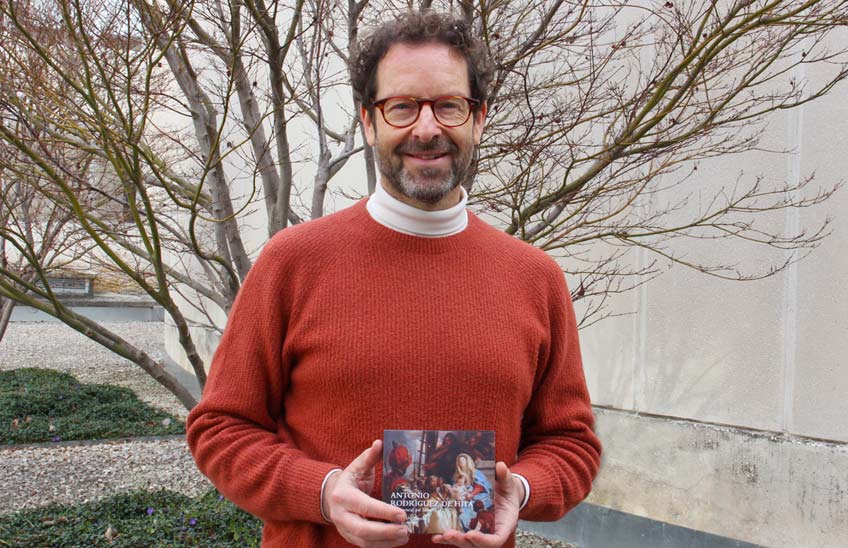The works eclipsed by zarzuela: musicologist Albert Recasens recovers the best sacred music of composer Antonio Rodríguez de Hita
The work of the researcher of the ICS has made possible the first world recording in modern times of some of the most outstanding pieces in Latin by the musician from Madrid.

FotoNatalia Rouzaut<br>/Albert Recasens
26 | 02 | 2024
Like a kind of search engine precious stones, the musicologist Albert Recasens, researcher of the group 'Vínculos, creatividad y cultura', of the Institute for Culture and Society (ICS) of the University of Navarra, went through archives and libraries with a goal: to recover the lesser-known works of the Madrid composer Antonio Rodríguez de Hita (Madrid, 1722-1787), one of the musical geniuses of the Spanish Enlightenment. The commission came from the Centro Nacional de Difusión Musical (CNDM) in 2022, on the occasion of the third centenary of the musician's birth.
A great connoisseur of the work and figure of Rodríguez de Hita, Recasens, director of La Grande Chapelle, initiated this work ofrecovery of the Spanish musical heritage, within the ICS, as he had already done with works by composers such as Tomás Luis de Victoria, Carlos Patiño and José de Baquedano. The result of this work of research has made possible the first recording at world level in modern times of some of the most outstanding vocal works in Latin of the illustrated composer. The album, published by Lauda, brings together a heterogeneous proposal , which includes several sacred genres: psalms, Epiphany responsories, a hymn, a motet, a lamentation... "It is not a unitary work. The common thread is the music that can move the public and the selection criterion is artistic quality," explains researcher. The recording was made after a concert performed at the Real Monasterio de San Jerónimo de Granada in June 2022.
The fact that Rodríguez de Hita is known for having created the comic zarzuela, along with the playwright Ramón de la Cruz, has largely overshadowed his sacred work, of great artistic value and weight in his musical production. "I was interested in focusing on the sacred repertoire because he was a chapel master musician and, of his nearly 250 works, the part dedicated to zarzuela is minimal. I wanted to make a fair selection that would give an idea of the style, importance and scope of this artist," Recasens points out. Although the composer also composed liturgical music at Spanish, the researcher decided to include only Latin pieces in order to favor their international diffusion.
With this goal, he undertook the study and selection of the pieces, especially in the Monastery of Montserrat, where most of his work is preserved. The research was meticulous, since this subject of compositions is preserved in the format of independent parts, not scores with all the voices or instruments: "It is a work that implies to be continuously reproducing that sonority".
As a result of this work, came the album, a bridge to bring the public closer to Rodríguez de Hita, of whom Recasens highlights his "creative and innovative character in his time": "In his work, he likes to break schemes. He is very imaginative in modulating and developing speech. For me, he is one of the great references of the 18th century in Spain and creator of a new artistic path".
In spite of being a contemporary of great musical figures such as Haydn or Mozart, the work of Rodríguez de Hita has had a much more limited run up to the present day. The researcher points out as causes the absence of musical printing presses in Spain with the strength of those of great European capitals such as Vienna or London; or historical events such as the disentailment of Mendizábal, which caused the dispersion or loss of part of the musical heritage, among other reasons.
In addition to the challenge of the recording process, Recasens emphasizes the challenge of "understanding the internal dynamics of the composer's style. There is a code that for today's audience would be very distant. And, as researchers, we have to make a process of adaptation, becoming a bridge between the past and the present". To facilitate this nexus, a webinar will be held on March 7 to approach this prolific bequest in the context of the Spanish Enlightenment. In the virtual meeting , moderated by ICS researcher Inés Olza, Recasens will be accompanied by experts Francisco Sánchez-Blanco Parody and Judith Ortega, professors at the Ruhr-Unviersität Bochum and the Complutense University of Madrid, respectively.
